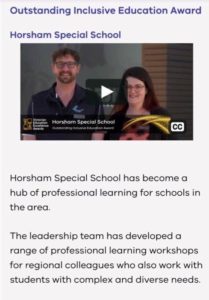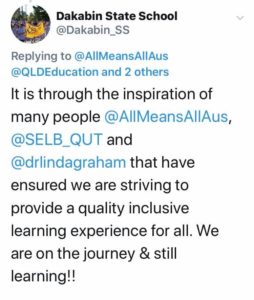27 October 2019
By Catia Malaquias
The last decade has seen a very significant proportionate increase in the numbers of Australian students with disability being placed in segregated ‘special education’ schools, units and classrooms.
Inclusive education awards, for excellence in implementing inclusive education in general education classrooms, have significant transformational potential for our education systems.
In the last 48 hours, the Queensland and Victorian Governments presented their respective annual State Education Awards. Unlike some other States, to their credit, Queensland and Victoria each present a specific award for excellence in “inclusive education”.
Both Queensland and Victoria’s respective education policies for students with disability promote inclusive education as a concept based on international human rights principles. However, their policies diverge in the clarity of their definitions of ‘inclusive education’ and the degree to which they conform to the international human rights framework.
Queensland’s Inclusive Education Policy specifically refers to the UN Committee on the Rights of Persons with Disabilities’ General Comment No. 4 (The Right to Inclusive Education), which clarifies Article 24 of the UN Convention on the Rights of Persons with Disabilities. Further, Queensland’s inclusive education policy quotes General Comment No. 4 in contrasting inclusion in general education settings with ‘segregation’ in separate settings and classrooms:
“Segregation occurs when the education of students with disabilities is provided in separate environments designed or used to respond to a particular or various impairments, in isolation from students without disabilities.” [GC4, para 11]
While the Victorian “Students With A Disability” Policy includes a section on “Inclusive Education”, it does not contain the word “inclusive’ or “inclusion” in its title and does not provide the clarity of General Comment No. 4 in its definition of “inclusive education”. In promoting inclusion, Victoria’s ‘Education for All’ policy states that “Inclusive education is supported by and is the realisation of a human rights based approach to education” but does not distinguish between general education settings and segregated “special’ schools, units or classrooms.
This difference in definitional approach and clarity plays out in their education systems, and played out in this years’ inclusive education awards.
Queensland, after ‘teething issues’ last year, tightened the inclusive education award criteria to general education schools – thereby sending a clear, powerful and necessary message that inclusive education, as a human right, is about supporting students with disability to learn together with their non-disabled peers in regular classrooms.
Narrowed to two State finalists, after the regional awards saw other inclusive schools recognised, Queensland announced Dakabin State School as the very deserving winner of the 2019 Excellence in Inclusive Education Award. In accepting the award, Principal Kelly Jeppeson said:
“Inclusion is at the heart of who we are as human beings at Dakabin, as educators and as leaders. I invite you to join the cause. Queensland kids deserve – and have the right – to a quality inclusive education on the same basis as their peers.
[…]
Inclusive Education is everybody’s role, everybody’s job, every minute of the day, every child, in every classroom. State schools are great schools because we benefit from that.”

Minister of Education Grace Grace with Kelly Jeppesen, Principal Dakabin State School and her Deputy, and QUT’s Executive Dean of Education, Carol Nicoll
Dakabin State School also acknowledged the support of academic experts and others who have been part of their inclusion journey so far.
Victoria on the other hand, awarded its 2019 Outstanding Inclusive Education Award to Horsham Special School.
 In establishing the new award, the Victorian Andrews Government touted the award as being “to celebrate teachers and support staff who demonstrated outstanding ability in improving student achievement, engagement and wellbeing”.
In establishing the new award, the Victorian Andrews Government touted the award as being “to celebrate teachers and support staff who demonstrated outstanding ability in improving student achievement, engagement and wellbeing”.
However, the award criteria expanded eligibility to include schools that have “delivered outstanding system improvements”. It would appear that in this broader sense of providing professional development and training for general education schools in its area that Horsham Special School was awarded.
While it is recognised that ‘special schools’ have important and valuable resources – something that General Comment No. 4 [at para 68] also acknowledges in calling for human, infrastructure and financial resources to be progressively transferred from segregated ‘special’ settings to a genuinely inclusive general education system – the maintenance of segregated ‘special schools’ (including with a regional professional development aspect) with their own continuing segregated school population is not an example of genuine ‘inclusive education’ (whether from a human rights perspective or from a layperson perspective).
Further, reliance on expertise from segregated settings is not without risk – institutions and staff that have been trained to deliver strategies within the structures and settings that are specific to segregated ‘special education’ are not necessarily skilled in providing advice on how best to support and accommodate students with disability in regular classrooms. Strategies developed in segregated settings are not necessarily transferrable or conducive to inclusion. As General Comment No. 4 also states “[a]ny support measures provided must be compliant with the goal of inclusion” [para 33].
The Victorian Government has missed an important opportunity.
Awarding a general education school for excellence in its implementation of inclusive education principles and its transformation to a genuinely inclusive school must, as a minimum, be the goal if such awards are to play a role in accelerating inclusive attitudinal change within both the public education system and the teacher unions.
We ask that the Victorian Government revisit its approach to its inclusive education award – to refine its potential as a valuable tool to transform the Victorian education system to a more genuinely inclusive system – rather than allowing it to reward and entrench segregated ‘special education’ infrastructure and to distort the vital understanding that inclusive education and disability segregation are fundamentally distinct models for the delivery of education to students with disabilities.
As they say “#Don’tCallItInclusionIfItIsn’t”.

